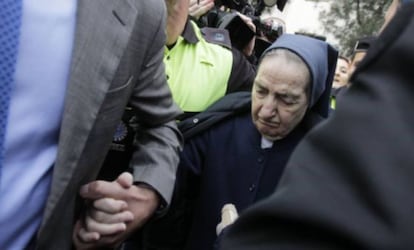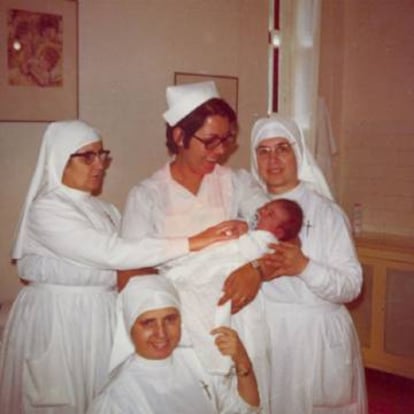The EU investigates the case of Spain’s stolen babies
A group of MEPs have met with the Attorney General, the Catholic Church and victims
The sum of €100,000 has been invested in a digital platform to investigate DNA data related to Spain’s stolen baby scandal, which involved the alleged theft and trafficking of thousands of babies in a scheme run by nuns, priests and doctors from 1940 until 1990.

This symbolic amount allocated by the government in its 2017 budget is the result of a historic agreement between the Popular Party and Podemos, and it opens a new chapter in a case that has attracted the attention of the European Parliament.
Towards the end of May, a group of MEPs came to Spain on a fact-finding mission that involved meetings with Attorney General José Manuel Maza, as well as representatives of the Spanish judiciary, members of a commission set up by Congress, and Church officials with a view to reviving the investigation into thousands of claims from families affected by a scam in which mothers were told their babies had died shortly after birth.
There comes a time when it’s not words we want, but action SOS Stolen Babies spokesperson
“Personally, I believe we are dealing with often contradictory evidence, including the scale of the scandal and whether we are looking at isolated cases or baby trafficking networks,” said Jude Kirton-Darling, a British Labour MEP and head of the delegation that was set up to deal with the flood of claims sent to the European Parliament’s Petitions Committee.
“The victims completely distrust the religious and political authorities," she said in an e-mail. “They have had to fulfill a demanding set of requirements for their claims to be considered valid and have frequently felt obliged to investigate their own cases alone, with little or no legal or psychological support. Some progress has been made since the scandal broke in 2009–10, but victim support needs to be improved. What has become clear is that the scandal is the rawest of the wounds left by the Spanish Civil War and the Franco dictatorship.”

Highlighting the fact that the EU commission’s official stance will be revealed in a report published between July and September, MEP and Popular Party member Rosa Estarás says: “We support anything that will uncover the truth but nothing that may be used for political leverage. That would be undermining the seriousness of the matter. The Attorney General and the attorney specializing in the case explained that there was no organized trafficking network. I know the victims don't see it like that and I also know there are different points of view. So far, there is no proof that this is a consequence of the Spanish Civil War. The report shouldn't contain personal opinions,” she concluded after meeting the European commission in Madrid.
In 2011, 261 people came forward to support the initial charge that put the scandal under the spotlight. Since then, various provincial prosecutor offices have received a total of 2,095 claims, of which 522 have been processed. However, time is not on the victims’ side. In 2013, Sor María, the nun accused of orchestrating the trafficking, died. Meanwhile, a doctor charged in 2016 is still awaiting trial.
“We don’t have much faith anymore,” says a spokesman for SOS Stolen Babies, a group of 400 affected families. “There comes a time when it’s not words we want, but action.”
“People are feeling demoralized,” says Enrique Vila, a lawyer for one of the associations that met the MEPs in Madrid. “The session [in Madrid] kicked off powerfully [as the claims were presented], but then there was a significant halt to the proceedings because the cases were filed, and getting a lawyer costs money. The state should process the claims and allocate state-appointed lawyers as they do with victims of domestic violence. But instead, each victim has to find the financial resources to take his or her claim to court, which isn’t right.”
I believe we are dealing with often contradictory evidence, including the scale of the scandal and whether we are looking at isolated cases or baby trafficking networks
Jude Kirton-Darling, MEP
State prosecutors, meanwhile, told MEPs that they would make every effort to find a solution and were already exploring ways to ensure the claims would be upheld. The MEPs will make recommendations in the report concerning both the claims and victim support. They will also make sure that the Spanish authorities keep any promises they make.
“The Catholic Church has agreed to open its files under certain conditions related to data protection,” says Kirton-Darling who met José Maria Gil Tamayo, Secretary-General of the Spanish Episcopal Conference during his visit. Subsequently, this Church body declined to comment on its collaboration, which could allow for cross-referencing between religious and public databases, facilitating the search between biological parents and their children.
English version by Heather Galloway.
Tu suscripción se está usando en otro dispositivo
¿Quieres añadir otro usuario a tu suscripción?
Si continúas leyendo en este dispositivo, no se podrá leer en el otro.
FlechaTu suscripción se está usando en otro dispositivo y solo puedes acceder a EL PAÍS desde un dispositivo a la vez.
Si quieres compartir tu cuenta, cambia tu suscripción a la modalidad Premium, así podrás añadir otro usuario. Cada uno accederá con su propia cuenta de email, lo que os permitirá personalizar vuestra experiencia en EL PAÍS.
¿Tienes una suscripción de empresa? Accede aquí para contratar más cuentas.
En el caso de no saber quién está usando tu cuenta, te recomendamos cambiar tu contraseña aquí.
Si decides continuar compartiendo tu cuenta, este mensaje se mostrará en tu dispositivo y en el de la otra persona que está usando tu cuenta de forma indefinida, afectando a tu experiencia de lectura. Puedes consultar aquí los términos y condiciones de la suscripción digital.









































